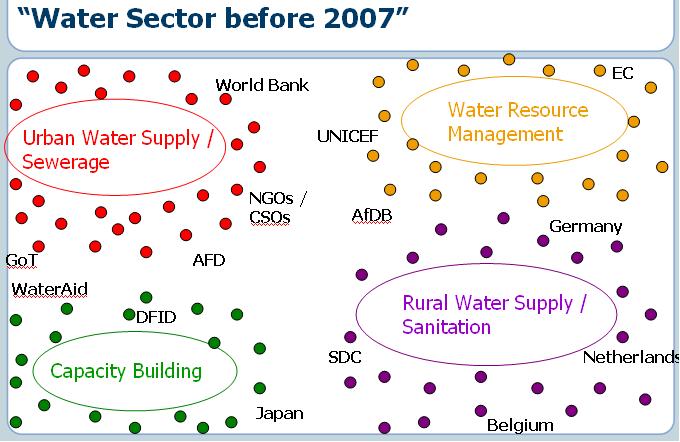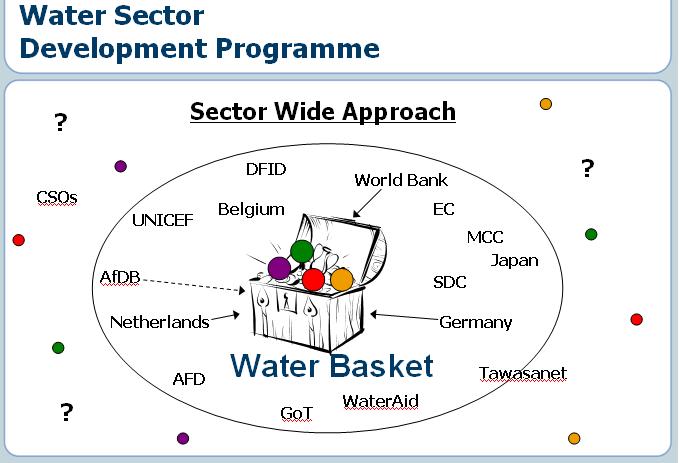I have just got in after a training course into the weird and wonderful ways and workings of the ‘Development Partnership Group' (DPG). The purpose of the DPG, and its many underlying sector and cluster working groups, is to manage the official development assistance (aid) coming into Tanzania, in a way that is joined up and in line with the country's own plans.
As a new 'partner', it is important that I and the others who have arrived over the last year get our heads around the structures in place to make sure we support them effectively.
Today we have learned 117 different acronyms, including the all important MKUKUTA (the national development strategy). We have learned about working groups, sectors and clusters; lead partners, active partners and delegated partners; and monitoring systems, targets and indicators. These are the basics that a newby like me needs to know before engaging with the system itself to be able to make a difference.
On a theoretical level, to the uninitiated this can all look a bit like bureaucracy gone mad, but there is a clear purpose to it. At the recent High Level Forum on Aid Effectiveness in Accra, the government and donors of Tanzania won an accolade for this system and its impact on the effectiveness of the aid. And there is a lot of this aid - around 2 billion dollars a year, around a third of the national budget. The idea of this prize winning system is that the aid is used to deliver the government's own plans for development, and transaction costs are reduced.
The example we were given was the water sector, where once some 15 donors all had their own water projects, all offering advice and finances to the government separately, each having their own monitoring systems to keep a check on where their pound, dollar or euro goes to, with different piles of paper work for the government to complete.

Now, instead there is one agreed plan for the water sector, and donors support this plan. This is similar to the way forwards for my work with the National Bureau of Statistics (NBS - one of the afore-mentioned acronyms!). Previously donors funded censuses and surveys in areas they were interested in, leaving other areas underfunded - now the NBS has led the production of a plan for the government statistics services in Tanzania and Zanzibar, and we will pool funds with other donors to implement this plan, to improve the data available in a more systematic way.

The day was of course also a great opportunity to meet lots of other new people who have recently arrived in Dar and who will be useful contacts both in work and out.

7 comments
Comment by Mary George posted on
You clearly understand this better than I do. If it makes a difference to the poor people of Africa that is great.
Comment by Emily Poskett posted on
Mary, sorry if I have made this seem complex! The point is that it is hard work for the donors, so that the amount of bureaucracy that the government has to deal with is reduced, and that means they can get on with the job of improving the lifes of the Tanzanian people. It means the advice they get from the development partners comes to them from one contact point, and hopefully helps them to make decisions in the way that is best for their people, and it means that aid money is easier to access and spend on their own priorities, rather than those chosen in London, Washington and other places. Hope this helps!
Comment by Mazharul Aziz posted on
Dear Emily Poskett,
I would like to comment on your topics. I am experiencing same problem in my country. I do work for the Ministry of Agriculture, Bangladesh. We have different donors who are working in relation to Climate Change issue and many others are willing to take that same kind of project. But we need coordinated efforts. We do not want pilot projects but we need nationwide works.
Thanks
Aziz
Comment by Neil Robertson posted on
Basket? What basket? This looks like a treasure chest to me?!
UK DfID is also I note firmly relegated to the periphery of the
new strategic diagram? That'll teach you to cause the total
collapse of the water supply system in Dar by privatising it!
Better luck next time ..... Puzzled too by the absence of any reference to Unesco in this account too - given that this UN
agency has a specific remit in freshwater management. Could
that perhaps reflect the low priority attached by DfID to this?
Oh and by the way: what happened to the sewage/sanitation programme between organograms? Did DfID wash its hands??!
Note too - in a UK context - that Tanzania and Ghana are two
countries receiving priority in this area from The Royal Society;
and that Scotland hosts a Unesco Centre for Water Law, Policy and Science in Dundee.
http://www.dundee.ac.uk/water/index.php
Comment by neil robertson posted on
Thirty years ago in Lesotho we wouldn't have stood for any of this nonsense, of course! As the Ministry of Finance we ran the recurrent budget and the Planning Office downstairs liaised with donors. There was a bi-annual donor conference to make sure that those offering assistance stuck to the broad outlines of
the Lesotho 5-year Development Plan which was developed by
Lesotho. None of this handing governmental functions over to
ODA as it was in those days when governments governed and donors knew their place. Co-ordination on the donor side was
done by UNDP; the World Bank was seen for what it was - a
bad joke; and the only 19th Street agency we really took any notice was of course the IMF. This is called self-determination.
And eventually too Lesotho even got round to having elections!
Comment by Emily Poskett posted on
Aziz - many thanks for your comment, it is good to hear views from the government side, I will alert DFID Bangladesh to your comments.
Neil - thanks for your two inputs to the debate. I am not an expert on the water sector (as I said I was just presented with this example the other day by those leading the coordination in the sector), but I dont think you need to worry about the picture in the slide show! Sanitation is integral part of the community or rural water supply and sewerage is an integral part of the commercial water supply - the point is that under the current arrangements, everything is captured as part of one overall strategy. The DPs mentioned on one of the slides are of course not complete. This slide simply shows that numerious DPs are active in the Tanzanina water sector and that progress has been made with regard to their coordination.
On the statistics side, which I am much more familiar with, the NBS welcomes the coordinated support behind their strategy, as it will help them to make progress on their priority areas instead of distorting their work programme to focus on donors favourite surveys. I will provide more details in my next post.
Comment by neil robertson posted on
I look forward to hearing more in due course about the coordinated support for the strategy of the National Bureau of Statistics in Tanzania. But to get
back to comparison of these two diagrams: should we be worried that there are more spots on the earlier version? Do spots reflect rainfall patterns? Is
there a drought on? And what is the state of sectoral statistical support for
the water sector in Tanzania at present? Is that an area where there might be a role for donor support and further UK input? eg Do you need buckets?
And/or nylon stockings? Or is hydrological sampling more sophisticated in the 21st Century than it was in the 1960's? Some of our universities here in Sccotland seem to use nano-technology these days to test for eg arsenic -
but how sustainable is that in a country like Tanzania? I would guess that
in the days of Julius Nyerere, testing water quality would be done at village level. Is that still the case? And are there training workshops for statisticians in village communities so that monitoring of water quality is sustainable? Or
do the NBS send samplers out into the field to test water quality at pumps?